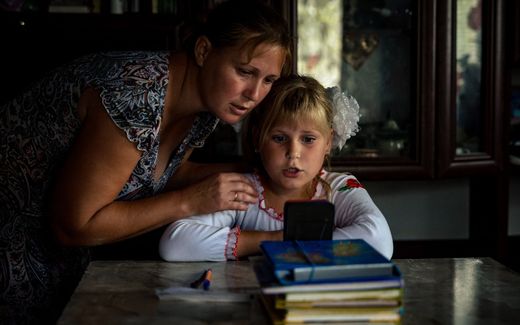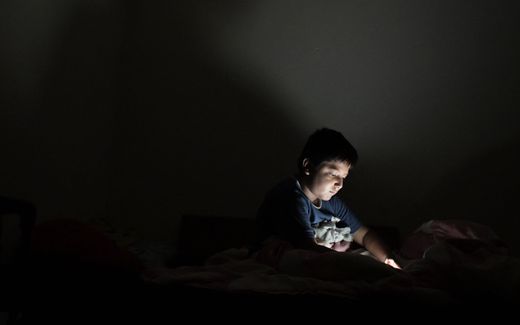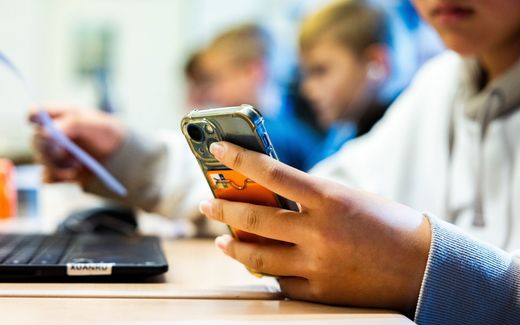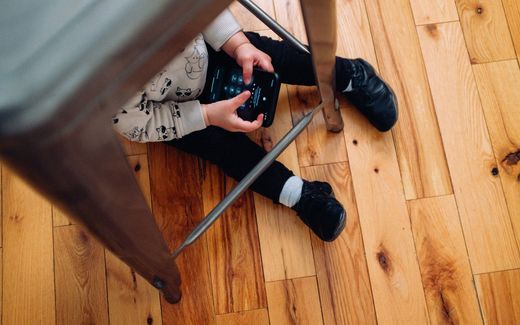Five lessons for families from Jonathan Haidt’s book about the smartphone

Two girls play with their smartphone. Photo ANP, Roos Koole
Christian Life
Would you let your child go to Mars for a new experiment? Probably not. However, many parents do not hesitate to give their children a smartphone before they are 10. And that too is an experiment of which the results are only just coming in. Five lessons about the smartphone from professor Jonathan Haidt's new book "The Anxious Generation".
Playing is crucial for children, and the smartphone interferes with that
Wherever you are, any time in history you study, you will find the same: playing children. And a fun fact: playing is crucial to their development into responsible, social adults who know how the world works, Haidt points out. Children who play together have a great chance to explore the risks in life, practise conversations with each other, and learn how to make decisions.
The problem nowadays is, says Haidt, that children spend more time on their smartphones than on being outside with their friends (who are also on their smartphones now). The American professor even calls smartphones "experience blockers". Time spent with friends has declined greatly in the last decade. Identity, individuality, emotions and relationships will develop differently in the online world than in real life. The culture on social media will, most likely, influence the social development of Generation Z (people born between 1995 and 2010).
Frequent smartphone use is devastating for the mental health of young people
This second lesson is closely related to the lesson mentioned above. Children and young adults have been lured into the world of social media by the promise of connection, Haidt explains. But instead, they were deceived. They meet their friends less often, because they spend more time on social media. But the online contacts are not a worthy replacement of these social interactions. Social media increases the number of social interactions, says Haidt. However, that also means that the quality and protective character of these bonds diminish.
By spending so much time online, girls, for example, no longer have the time for long conversations with one or two special friends. Instead, they fell into a sea of shallow and unreliable friends, followers and acquaintances. When quantity overrules quality, loneliness increases massively.
The rates of depression and suicidal feelings have skyrocketed among Generation Z, the people who have grown up with a smartphone. They are much more anxious and depressed than the previous generation of millennials, statistics show. The more you give in to social media, the lonelier and more depressive you become, Haidt warns.
Parents focus too much on dangers in the offline world
Modern parents are warned for all the dangers that lurk on the streets. For example, many parents fear that their children will be kidnapped if they don't pay attention to their kids. Other parents are afraid of their children getting hurt by playing outside. Therefore, playgrounds are safer than ever to protect children. And this takes away from the fun and the benefits of playing outside, according to Haidt.
Instead, parents should be much more worried about the online lives of their children than about the dangers on the street. The online world is much more dangerous than the real world, Haidt says. Never before have girls been so exposed to social comparison, to sexual predators and online bullies, for example. Never have boys been so vulnerable to social isolation and to addictions to pornography and games. There is even a phenomenon of boys who never leave their own rooms anymore and are swallowed up by the online world.
And all these dangers can lead to severe mental problems, as mentioned above.
Peer pressure is the main reason why so many children own a smartphone at a young age
Ever wondered why some children get their first smartphone at the age of 6 already? According to Haidt, this is because of peer pressure. What would you, as a parent, do when your child comes home and says that he really needs an iPhone because everybody else does? Or when your daughter misses a large part of the social interaction with her classmates because she does not own a smartphone? Many parents will find it very difficult to resist these arguments. And the more they give in, the more the statements become true. Therefore, Haidt thinks the dilemma of smartphones and young children is mainly a social problem.
We can actually counter the harms that smartphones cause
Although the influence of smartphones is great, widespread and harmful, it is not impossible to counter the trend, Haidt asserts. What is necessary is collective action, he says. Parents should contact the parents of their children's classmates and form agreements on when to give the children a smartphone. If more and more children in the classroom do not own a smartphone, it will be easier for parents to say no to the device.
Above all, parents should do their best to let their child grow up as a child. In other words, Haidt says, bring back play. Let children explore the real world without constant parental supervision.
Together is the keyword in these solutions, Haidt emphasises. The more families join, the easier it becomes.
Related Articles










